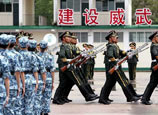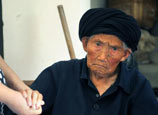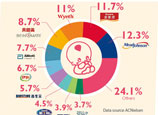
"International nonprofit organizations are no longer regarded as demons and they will contribute to local development as long as they run their projects based on local laws," the official said.
Considering the local conditions in Yunnan, the 39 international NGOs mostly focus on health, education and poverty alleviation, he said.
"One obvious difference is that an NGO that is on the records is able to advertise in newspapers and on television to recruit workers. ... However, it was impossible before," the official added.
Wang Zhenyao, director of the China Philanthropy Research Institute at Beijing Normal University, said international NGOs have long been regarded by many as a threat to the government and had difficulty in registration.
"Now the Ministry of Civil Affairs has given the power to the provincial level. It is a big step forward and will facilitate the work of NGOs," Wang said.
Deng Fei, who started the "Free Lunch for Children in Rural China" program, said the reform "will definitely give confidence to us in the philanthropic enterprises".
Wang Ming, president of the Nongovernmental Organization Research Institute at Tsinghua University, said Yunnan's way of dealing with international NGOs could be seen as an important trial for the nationwide reform.
"Other provinces and regions could learn from Yunnan to better manage international charities and NGOs," Wang said.
A spokeswoman for the China program of Save the Children, a charity based in Britain, said, "I can see some progress and a more friendly environment for international NGOs."
Like most other international NGOs, Save the Children had been registered as a business entity under the State Administration for Industry and Commerce before recently being granted legal status as an NGO.
The spokeswoman said that being registered as an NGO helps better manage the organization when considering project planning and preferential taxation.
"We would wish to see simpler procedures for registration in the new regulations," she said.
However, not all the NGOs are as lucky as Save the Children.
Greenpeace, the international environmental organization that entered China in 2002, can only register as an international corporation, as most other NGOs do.
Yong Rong, the organization's media officer in Beijng, said the major obstacle for being registered is that it is hard to find a supervising department as required.
She said Greenpeace carried out projects that involved several ministries. "All these ministries could supervise us, but none were willing to do so," said Yong. She hopes the new regulation will make registration easier.
Wang Chao, chief operating officer at the World Wildlife Fund, said that allowing provincial authorities to oversee registration and supervision will help NGOs to better carry out projects in different provinces.

















 116-year-old Chinese woman recognized as world's oldest
116-year-old Chinese woman recognized as world's oldest


![]()
